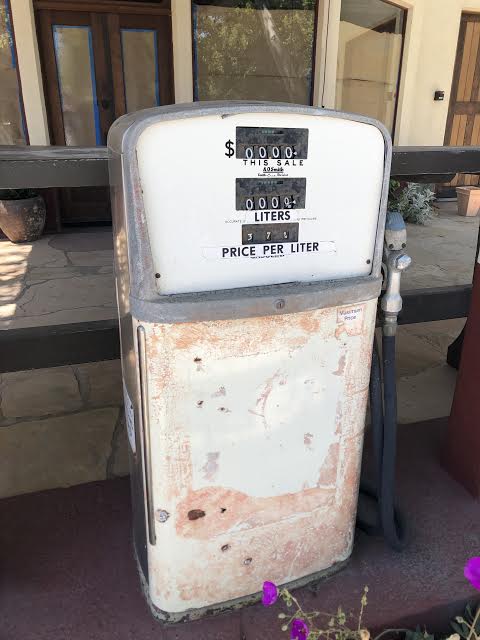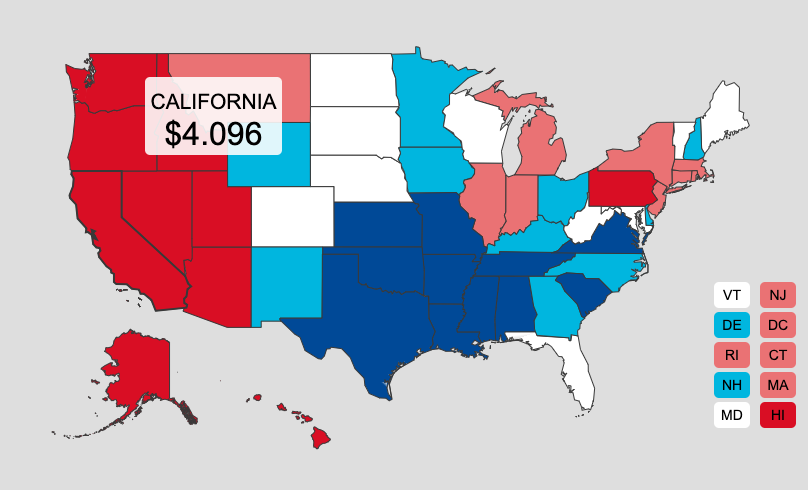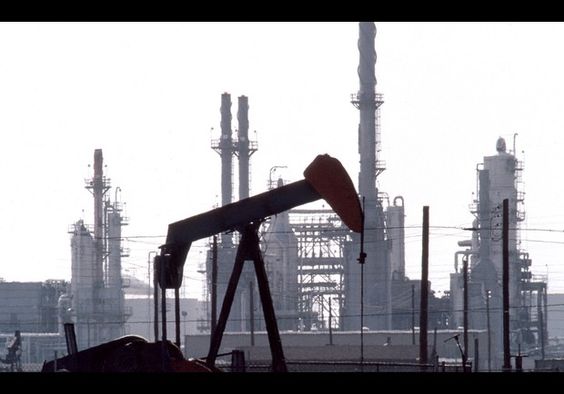
Old gas pump at 'The Station, Los Alamos, CA. (Photo: Katy Grimes for California Globe)
California Shifts Blame for High Gas Prices
State’s gas prices include $1.40 per gallon, inclusive of all taxes and governmental fees
By Marc Joffe, August 8, 2023 6:18 am
By Marc Joffe and Ryan Bourne
Although they are off their all-time highs, gasoline prices in California remain elevated. Gas Buddy recently reported that statewide gas prices averaged $4.89. This was $1.08 higher than average prices in neighboring Arizona and $1.50 more than Texas, another state that has been attracting many California emigrees.
Governor Gavin Newsom and the California Legislature have responded by passing a new law to identify and penalize oil company price gouging. The new law creates a state watchdog within the California Energy Commission (CEC) to investigate allegations of price gouging. The legislation gives it the power to cap refiners’ gross margins and to impose civil penalties on companies it finds to be liable.
Anti-price gouging legislation of this kind is usually opposed by economists. If a supply-shock hits a refinery, reducing production and pushing up the market price of gasoline, then a higher profit margin encourages other refiners to ramp up their production to meet the unmet demand. This profit incentive to call on supply is particularly important in California, given legislation dictates a special fuel blend, which means refined fuel can’t be simply diverted from elsewhere.
Newsom and other politicians, however, do not trust this market price mechanism to operate effectively. After a 2015 fire at a refinery in Torrance, CA, gas prices shot up, but then appeared to persist at a higher level, even after capacity had been rebuilt. The politicians just assume profiteering from refiners, but careful energy economists think this a mystery to be explored, with poor downstream retail competition the likeliest culprit.
When you look at California gas prices carefully it is obvious that a lot of state interventions raise the price of fuel for Californians. The average state tax on gasoline nationwide is currently 31.6 cents per gallon. California’s state gas excise tax alone is 57.9 cents per gallon.
According to the CEC’s own data, the state’s gasoline prices currently include about $1.40 per gallon, inclusive of all taxes and governmental fees. These taxes and fees have more than tripled since 1999, when the Commission began reporting the components of gas prices at the pump.
Aside from the state and federal excise taxes, state and local sales taxes, and fees for underground storage tanks and oil spill prevention, the CEC’s total includes costs associated with California’s Cap-and-Trade program and its Low Carbon Fuel Standard (LFCS).
California’s cap-and-trade program, jointly administered with the province of Quebec, auctions pollution allowances to oil refiners and other companies that produce carbon emissions. The refiners pass the costs of these allowances through to consumers. One quarter of the proceeds from cap-and-trade go to the California High-Speed Rail project which is supposed to reduce emissions by replacing car and plane trips but has yet to do so due to construction delays.
LFCS encourages energy companies to use lower carbon fuels such as ethanol and biodiesel. Firms can obtain LFCS credits by using these low carbon fuels or by purchasing them. When refiners purchase LFCS credits they pass the costs on to consumers.
Beyond imposing various taxes and fees, California governments are doing other things that raise the cost of gasoline at the pump. Since 1992, California has required gas stations to sell a special gasoline blend that reduces smog. Recently, the Wall Street Journal reported that the California special blend adds between ten and fifteen cents to the state’s gas prices.
Any additional California price premium might be explained by a lack of retail competition in gasoline. On that front, California local governments are banning the construction of new gas stations—a move that will reduce competition between stations.
This new trend is centered in Sonoma County, in the wine country north of San Francisco. The County government recently banned new gas stations in unincorporated areas, following the lead of several cities that imposed similar restrictions in 2021 and 2022. Gas prices in Sonoma County are already elevated compared to California averages, and this gap may well widen as existing stations are closed and not replaced.
Governor Newsom’s press release announcing the new price gouging law claims that his actions have helped lead to a $1.50 reduction in gas prices. But the main reason for the reduction in gas prices has been lower crude oil prices. The Commission’s data show that on a per gallon basis, crude oil’s contribution to California gas prices fell from a peak of $3 in June 2022 to less than $2 recently. Meanwhile, the state’s legislative majority rejected a bid to cancel a scheduled four cent increase in California’s gas tax on July 1.
So, while it may be convenient to scapegoat oil companies for California’s high gas prices, the governor and state lawmakers can more readily find the true culprits by simply looking in the mirror.
 Ryan Bourne is the R. Evan Scharf Chair for the Public Understanding of Economics, Cato Institute.
Ryan Bourne is the R. Evan Scharf Chair for the Public Understanding of Economics, Cato Institute.
- California Shifts Blame for High Gas Prices - August 8, 2023
- Are Wasteful California Rail Projects Falling Out of Fashion? - January 24, 2023
- California Needs to Reassess Stay-at-Home Orders to Prevent an Economic Tragedy - April 20, 2020





Too bad we don’t have anti-price gouging legislation for the California Democrats!! They charge too much for sales tax, income tax, business taxes, regulation taxes, etc, etc etc……
boondoggles, scams, and elaborate schemes. I wish we had a government that was here to improve our lives, and not setup some fake grifting “market” to trade in imaginary carbon credits to build imaginary 8 trillion dollar high speed rail systems that will never be complete.
“Gavin” & my former party operatives (legislature & bureaucrats), are leading the way for the elitist DC Swamp=Rats back in hopelessly-corrupt Washington DC~! Also, Katy Grimes shows us the mentality as to that saying, “The CAGOP, The Party That Loves to Lose”, in her blocking me from her FB page after Phil Cowan, long past KTKZ morning show person, temporarily got mad at me. Having been a long-time follower of Katy Crimes, this shows the CAGOP’s elitist harshness~!